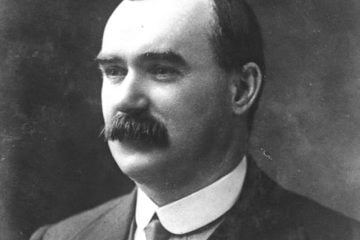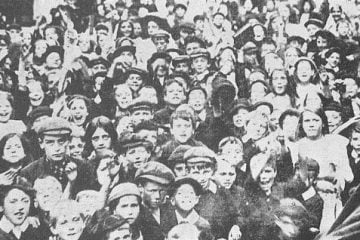The root cause of all forms of oppression is the division of society into classes. This oppression can take many forms. Alongside class oppression we find the oppression of one nation over another, racial oppression, and the oppression of women.
Marxists must fight against oppression and discrimination in all its forms, while pointing out that only a radical transformation of society and the abolition of class oppression can create the conditions for the abolition of oppression in all its manifestations and the establishment of a truly human society based upon equality, justice and freedom.
The oppression of women didn’t always exist. In fact, the family as we know it today hasn’t always existed. Marxism explains that it arose together with class society, private property and the state. The oppression of women is only as old as the division of society into classes. Its abolition is therefore dependent on the abolition of classes, that is, on the socialist revolution.
This doesn’t mean that the oppression of women will automatically vanish when the proletariat takes power. The psychological heritage of class barbarism will finally be overcome when the social conditions are created for the establishment of real human relations between men and women. But unless and until the proletariat overthrows capitalism and lays the conditions for the achievement of a classless society, no genuine emancipation of women is possible.
Nor does it mean that women should wait for the socialist revolution to solve their problems and in the meantime submit meekly to discrimination, humiliation and male domination. On the contrary, without the day-to -day struggle for advance under the present society, the social revolution would be unthinkable. It’s precisely through the struggle for partial gains and reforms that the working class as a whole learns, develops its consciousness, acquires a sense of its own power, and raises itself to the level demanded by great historical tasks.
Women are not objects
by Fiona Lali, SOAS Marxists
Turning on our phones, opening a paper or walking out onto the street, we’re constantly drowned in images of female perfection. The beauty standards are oppressive, exacting and utterly unattainable. For example, images in the media often promote a traditionally European ideal of womanhood, even in our modern multicultural society.
This objectification of women in the media and society is rooted in capitalism. Separating women from a feeling of comfort and acceptance of our bodies is used to sell things to us. And the sexualisation of women is used as a marketing tool to make as large a profit as possible. This unhealthy depiction of women normalises harmful attitudes within society.
A woman’s existence should not be rooted in her desirability. Yet the capitalist class in control of the media continues to churn out overtly sexual images of female bodies. These people are responsible for fueling the sexism that results in increasing rates of degradation and violence against women. Specifically, scenes in film and TV that trivialize rape and glorify violence to advance storylines encourage the reduction of women to passive objects of male desire.
The issue of objectification is ultimately a class question. As long as the capitalist class maintains its monopoly over the media, women will be objectified for profit. The feminist movement makes strides towards changing people’s perceptions, but we also need to remove the overarching economic system. The only way to end this treatment of women is to dismantle the capitalist system that ensnares us.
A woman’s place is in the revolution, not the kitchen
by Kelly Lane, Sheffield Marxists
The burden of domestic tasks has been forced on the shoulders of women throughout the capitalist epoch. Women are expected to adhere unquestioningly to traditional family roles, to be isolated within the home and to take full responsibility for looking after the children and the upkeep of the house. Despite the enormous burden of these tasks, they can’t be directly exploited for profit by the capitalists, so they’ve always been considered less important or not “real work”.
Now, more and more women are becoming part of the workforce. Women make up just under half (46%) of workers in the UK, and 74% of women who have children also work. In 2015 one third of British working mothers were the main income provider for their families.
So, we see women are taking on even more work than they previously had: not only are they now a huge part of the workforce, it’s also assumed they will automatically carry on their unpaid labour in the home alongside this! This double burden of exploitation must come to an end, and the only way is with a complete revolutionary transformation of society.
We should be sharing out all the work in society equally, so those at the bottom aren’t working themselves to death just so those at the top can laze around in luxury. Then we could reduce the length of the working day. With more time, the burden of domestic labour could be shared out, and household work and the raising of children could be socialised.
A society like this would be for the benefit of all workers, especially women. This is a socialist society!
Equal pay for equal work
by Hasnaa, UCL Marxists
It’s often said that gender discrimination in the workplace is a phenomenon of the past, with the introduction of The Equal Pay Act in the 1970s and the increase of women workers. However this is not the case. Currently, the pay gap between men and women is around 20% with the majority of women employed in the precarious service sector. In fact, the situation continues to worsen, in 2014 average annual wages for women fell from £18,000 to £15,400, while for men the figure was stagnant at £24,800.
As we can see, even with the Equal Pay Act we have not seen a significant change in the pay differential between men and women which reveal that there is a more deep rooted problem that cannot be resolved through laws and agreements. So what could be the issue? The fact is that increasing profits by squeezing wages is an inherent part of capitalism. When women joined the workforce they were treated as cheap labour, being paid only what the factory owners were willing to pay and barred from joining trade unions as they were seen as a threat to male workers. This inequality was justified by the exaggeration of biological differences.
Capitalism exists to create as much profit as possible and one way of achieving this is to spend the absolute minimum on the cost of labour power. A system like this will never allow full equality, but will continue to create artificial divisions of the working class, if not through gender then through race, nationality, religion etc. Therefore, the fight for the equal pay of women along with better maternity, childcare and flexible hours is inseparable from the class struggle and the emancipation of the working class.
Marxists fight for the liberation of the working class so that all women may be liberated from the exploitative conditions of a male-dominated society under capitalism.



